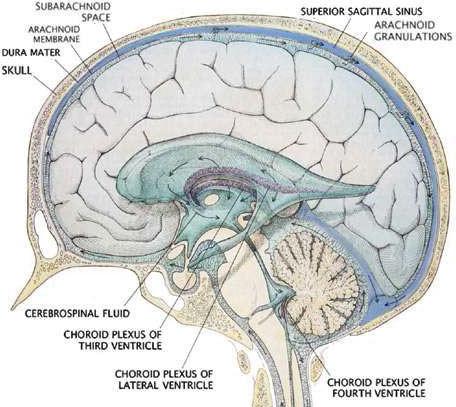Many worthless medical products and procedures are widely marketed and sold, some falling under the alternative medicine label. Two examples I am intimately familiar with are the irrational use of megavitamins C and E. In humans, the two are the principal exogenous antioxidants, and they are essential for body and brain health. Antioxidant vitamins C and E are particularly important in the brain because neurons that are damaged and die by uncontrolled oxidation cannot be replaced in the adult human brain, i.e., there is no neurogenesis after about age seven (Arellano et al. 2018).

CHOROID PLEXUS sits within the fluid-filled chambers in the brain called ventricles. It continuously secretes cerebrospinal fluid (CSF), which cushions the nervous system, carries some nutrients to brain tissues, and cleanses the brain of wastes. As new CSF is produced, old CSF is forced to flow through the ventricles, around the spinal cord, and into the subarachnoid space around the brain.
Credit: Carol Donner
Other exogenous antioxidants in foods or supplements generally do not enter the human brain and cannot substitute for vitamins C and E. After careful analysis of the data, public health authorities have published recommended daily allowances (RDAs) for vitamins. For vitamin C, the RDA is 60 mg daily (up to 140 mg for smokers); for vitamin E, 30 international units of α-tocopherol (vitamin E) daily. However, in the 1970s, the double Nobel laureate Linus Pauling recommended megavitamin C therapy (greater than ten times the RDA) for those who suffer from some brain diseases, including schizophrenia; he also suggested that megavitamin C could make one “think better.” We now know that these recommendations are incorrect. In 1977, I explained to Professor Pauling in person and published correspondence (Pauling and Spector 1977) why his theories were incorrect. Even more distressing, decades later, professorial recommendations from some prestigious university faculties (e.g., Willet 2003) recommended daily doses of vitamin C of 200 to 300 mg; Willet also suggested that daily megavitamin E was safe and might prevent cardiovascular disease, including stroke (Willet 2003). Even in 2002, we knew that was bad advice (Spector and Vesell 2002). Yet to this day, billions of dollars have been spent on worthless or even harmful megavitamin therapy. Moreover, it is also clear that daily RDA multivitamins in most Americans are unnecessary for body and brain health (Haslam and Prasad 2018). Yet again, billions have been spent on multivitamins. How did the persistent “craze” for megavitamins and multivitamins come about and why does it continue? Is this fixation just a waste of money or does it have harmful effects? These are issues I will explore focusing on brain health. There is a grain of truth in multivitamin and megavitamin therapy in rare clinical situations, as discussed below.
Leggete l'articolo completo e molti altri in questo numero di
Skeptical Inquirer
Opzioni di acquisto di seguito
Se il problema è vostro,
Accesso per leggere subito l'articolo completo.
Singolo numero digitale
March/April 2019
Questo numero e altri numeri arretrati non sono inclusi in un nuovo
abbonamento. Gli abbonamenti comprendono l'ultimo numero regolare e i nuovi numeri pubblicati durante l'abbonamento. Skeptical Inquirer
Abbonamento digitale annuale
€19,99
fatturati annualmente